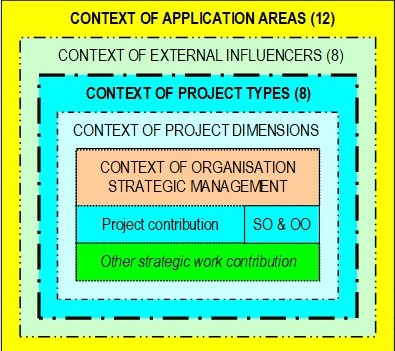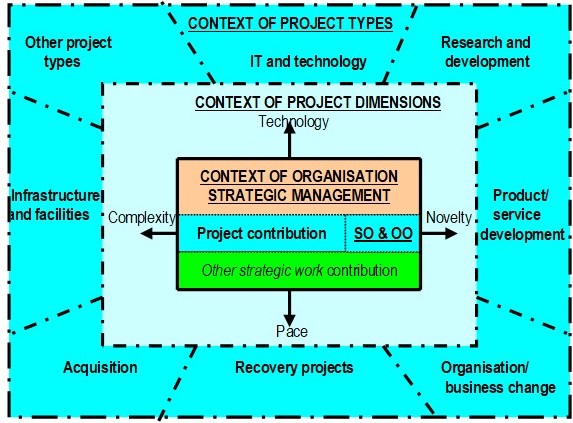Series on Project Contexts
SERIES ARTICLE
By Alan Stretton, PhD (Hon)
Sydney, Australia
INTRODUCTION
This is the fifth of a series of seven articles which identify and discuss a variety of key contexts which impact on the management of projects. The basic reason for developing this series is that there is far too little attention given to the contexts of projects in the relevant literature – particularly when you consider that, in practice, effective management of projects’ contexts is usually quite critical to achieving overall project management (PM) success.
The first article of this series (Stretton 2019e) identified six key types of project contexts. These were summarised pictorially into a combined model, depicted in skeleton format in Figure 1.

Figure 1: Outline project context model
The second article of this series (Stretton 2019f) was concerned with the context of organisational strategic management; the third (Stretton 2019g) with the contexts of projects being undertaken by supplier organisations (SOs) and owner organisations (OOs); and the fourth (Stretton 2019h) with the contexts of what Shenhar & Dvir 2007 describe as project dimensions. This article is concerned with project types in a more general context. Its position in Figure 1 is shown in heavier outlines.
RECAPPING DISCUSSIONS OF THE CONTEXT OF PROJECT TYPES IN THE FIRST ARTICLE
In Stretton 2019e I drew from some earlier articles I had written in this journal on categorising projects and programs (Stretton 2014f, 2014g). In the latter article I started with two listings from Japan’s P2M (PMAJ 2008). These were mixtures of program/project types and application areas, which I separated into a listing of six types of projects, and ten application areas. I then made slight amendments and additions to the list of types of projects, which were added to previous contexts, to arrive at the Figure 2, as reproduced below.

Figure 2: Adding the context of project types to the previous contexts
THE KEY IMPORTANCE OF FAMILIARITY WITH THE NATURE OF THE WORK INVOLVED IN THE PROJECT BEING MANAGED
Different PM approaches are needed for different types of project work
Archibald & Prado 2014 point to the importance of the project manager having specific familiarity about the nature of the work involved with the particular type of project, and to have PM approaches with are appropriate to its management:
….for a project to be successful, different types of project work associated with different types of project need to be managed differently. An experienced engineering-procurement-construction (EPC) project manager will often not be very successful managing a typical information technology (IT) software project. The project management methods and tools that are successful for an EPC facilities project are not very useful for an IT or new product development project.
Giammalvo 2019 points to the difference that the type of project work makes to the management of that project in even stronger terms:
….who in their right mind would believe that just because an individual was a great IT project manager that he/she could become the project manager to engineer, procure and construct a bridge?
These quotations emphasise the key point to be made about the relevance of the context of these broad different project types. In addition to project-specific differences, the nature of the work to be done within each project type is distinctive to that category. So, in addition to appropriate skills in project management per se, the project manager and project team members need to bring specific nature-of-work related knowledge, skills and experience to bear on their project to ensure that the totality of the work is effectively prosecuted.
More…
To read entire article, click here
How to cite this paper: Stretton, A. (2019). 5. Contexts of project types, Series on Project Contexts; PM World Journal, Volume VIII, Issue IX, October. Available online at https://pmworldlibrary.net/wp-content/uploads/2019/10/pmwj86-Oct2019-Stretton-5-contexts-of-project-types-series-article.pdf
About the Author

Alan Stretton, PhD
Faculty Corps, University of Management
and Technology, Arlington, VA (USA)
Life Fellow, AIPM (Australia)
![]()
Alan Stretton is one of the pioneers of modern project management. He is currently a member of the Faculty Corps for the University of Management & Technology (UMT), USA. In 2006 he retired from a position as Adjunct Professor of Project Management in the Faculty of Design, Architecture and Building at the University of Technology, Sydney (UTS), Australia, which he joined in 1988 to develop and deliver a Master of Project Management program. Prior to joining UTS, Mr. Stretton worked in the building and construction industries in Australia, New Zealand and the USA for some 38 years, which included the project management of construction, R&D, introduction of information and control systems, internal management education programs and organizational change projects. He has degrees in Civil Engineering (BE, Tasmania) and Mathematics (MA, Oxford), and an honorary PhD in strategy, programme and project management (ESC, Lille, France). Alan was Chairman of the Standards (PMBOK) Committee of the Project Management Institute (PMI®) from late 1989 to early 1992. He held a similar position with the Australian Institute of Project Management (AIPM), and was elected a Life Fellow of AIPM in 1996. He was a member of the Core Working Group in the development of the Australian National Competency Standards for Project Management. He has published over 200 professional articles and papers. Alan can be contacted at alanailene@bigpond.com.au.
To see more works by Alan Stretton, visit his author showcase in the PM World Library at http://pmworldlibrary.net/authors/alan-stretton/.









